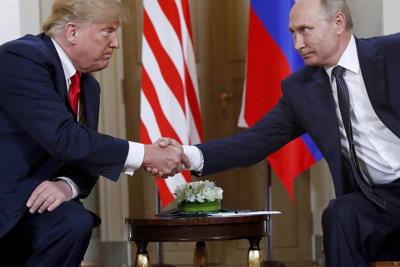As the presidents of the United States and Russia converge on a U.S. military base in Alaska to discuss the war in Ukraine, the latterÔÇÖs president, Volodymyr Zelenskyy, and other Ukrainian officials will be watching closely. The rest of AmericaÔÇÖs allies should be watching closely, too. One day, they could be whatÔÇÖs on the agenda.
The summit has already been hailed as a victory for Vladimir Putin. And thereÔÇÖs some truth to that. It does mark a relaxation of the diplomatic isolation heÔÇÖs been in since he expanded RussiaÔÇÖs invasion of Ukraine three and a half years ago. But itÔÇÖs certainly possible that Donald Trump has become fed up enough with the conflict to bring AmericaÔÇÖs considerable power to bear against RussiaÔÇÖs hobbled economy.
ThatÔÇÖs an optimistic take, granted. Trump is fickle and feckless, and heÔÇÖs always been bizarrely in thrall to authoritarian leaders. ThereÔÇÖs every chance Putin outfoxes him. LetÔÇÖs hope that doesnÔÇÖt happen and that America, standing with its beleaguered Ukrainian ally, forces Russia to abandon its relentless invasion and air attacks. Even a ceasefire in the air would bring some relief to those living in UkraineÔÇÖs cities, the primary targets of Russian terror bombings. After more than three long and hard years, even that would mark an improvement for the people of Ukraine.
The worst-case scenario, of course, is that Putin charms Trump (or outwits him), and Trump ends up agreeing to some kind of ceasefire framework that advantages the Russians. Before leaving for Alaska from Washington, Trump assured reporters that he had no intention of accepting any deal that would allow Russia to assume control over any territory it hasnÔÇÖt seized on the battlefield; he also said the Ukrainians would have final say over any territorial concessions. The president portrayed this as a preliminary meeting, not a final one, stating that the war would only be ended by three-way diplomacy between the U.S., Russia, and Ukraine.
Great. Now letÔÇÖs see if heÔÇÖs still saying any of those things in 24 hours.
In fact, thatÔÇÖs why all the other allies need to watch this. European rearmament is accelerating rapidly; the Financial Times reported just days ago that factories for munitions and military equipment are finally beginning to expand rapidly in Europe. The continent is drawing closer to being able to defend itself one day. Some of AmericaÔÇÖs Asian allies are similarly arming up. Alas, we Canadians seem to be taking the summer off: other than a necessary and right raise for military personnel, weÔÇÖve yet to hear much about what we are doing to see to our own security.
Taken together, these are tangible signs that at least some of the allies are starting to realize their future security cannot count on American military, economic or political support. None of the allies has figured this out fast enough, but some have certainly figured it out faster than others, with Canada unfortunately very much not leading that pack.
It remains to be seen exactly how this new era of U.S. global engagement is going to play out. ItÔÇÖs possible that the more isolationist elements of the MAGA-fied Republican Party will win, but itÔÇÖs also possible that weÔÇÖll see America stay just engaged enough with its allies to be able to demand political and economic concessions from them. As tempting as some American leaders might find the notion returning to 1930s-style neutrality and isolationism, they may yet decide that having allies beholden to you is a more effective way to put the squeeze on them.
The world will get a peek at that dynamic over the next day or so in Alaska. The Ukrainians will soon find out how committed America remains to their defence, and the rest of us will find out ÔÇö or at least get a better sense ÔÇö of exactly how much of a hurry we should all be in to become better able to defend ourselves.
Elbows up isnÔÇÖt going to cut it. Right now, America is still trying to disentangle itself from the war in eastern Europe, and that gives the rest of us time. We should use it. Because next time, Putin or some other authoritarian might fly to Alaska to haggle with Trump about us, or the Koreans, or the Estonians, not the Ukrainians. And like Zelenskyy, we may find ourselves left off the invite list.
Error! Sorry, there was an error processing your request.
There was a problem with the recaptcha. Please try again.
You may unsubscribe at any time. By signing up, you agree to our and . This site is protected by reCAPTCHA and the Google and apply.
Want more of the latest from us? Sign up for more at our newsletter page.



























To join the conversation set a first and last name in your user profile.
Sign in or register for free to join the Conversation